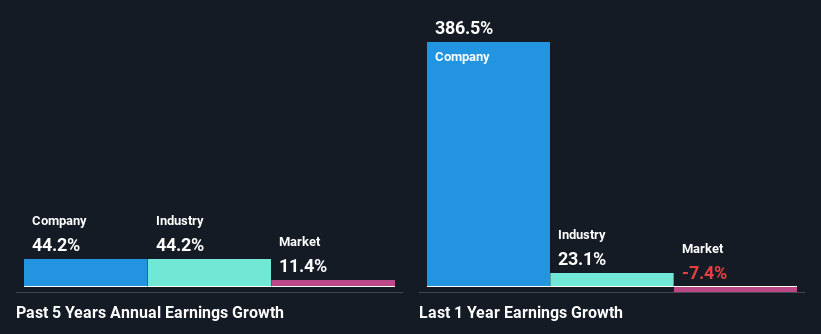It is hard to get excited after looking at MTQ’s (SGX:M05) recent performance, when its stock has declined 6.9% over the past three months. But if you pay close attention, you might gather that its strong financials could mean that the stock could potentially see an increase in value in the long-term, given how markets usually reward companies with good financial health. In this article, we decided to focus on MTQ’s ROE.
Return on equity or ROE is a key measure used to assess how efficiently a company’s management is utilizing the company’s capital. Put another way, it reveals the company’s success at turning shareholder investments into profits.
View our latest analysis for MTQ
How Is ROE Calculated?
ROE can be calculated by using the formula:
Return on Equity = Net Profit (from continuing operations) ÷ Shareholders’ Equity
So, based on the above formula, the ROE for MTQ is:
13% = S$9.8m ÷ S$73m (Based on the trailing twelve months to September 2023).
The ‘return’ is the amount earned after tax over the last twelve months. One way to conceptualize this is that for each SGD1 of shareholders’ capital it has, the company made SGD0.13 in profit.
What Is The Relationship Between ROE And Earnings Growth?
Thus far, we have learned that ROE measures how efficiently a company is generating its profits. Based on how much of its profits the company chooses to reinvest or “retain”, we are then able to evaluate a company’s future ability to generate profits. Assuming everything else remains unchanged, the higher the ROE and profit retention, the higher the growth rate of a company compared to companies that don’t necessarily bear these characteristics.
MTQ’s Earnings Growth And 13% ROE
To begin with, MTQ seems to have a respectable ROE. Especially when compared to the industry average of 7.5% the company’s ROE looks pretty impressive. Probably as a result of this, MTQ was able to see an impressive net income growth of 44% over the last five years. We reckon that there could also be other factors at play here. For example, it is possible that the company’s management has made some good strategic decisions, or that the company has a low payout ratio.
We then performed a comparison between MTQ’s net income growth with the industry, which revealed that the company’s growth is similar to the average industry growth of 44% in the same 5-year period.
Earnings growth is a huge factor in stock valuation. It’s important for an investor to know whether the market has priced in the company’s expected earnings growth (or decline). By doing so, they will have an idea if the stock is headed into clear blue waters or if swampy waters await. One good indicator of expected earnings growth is the P/E ratio which determines the price the market is willing to pay for a stock based on its earnings prospects. So, you may want to check if MTQ is trading on a high P/E or a low P/E, relative to its industry.
Is MTQ Using Its Retained Earnings Effectively?
MTQ has a really low three-year median payout ratio of 25%, meaning that it has the remaining 75% left over to reinvest into its business. So it seems like the management is reinvesting profits heavily to grow its business and this reflects in its earnings growth number.
Additionally, MTQ has paid dividends over a period of at least ten years which means that the company is pretty serious about sharing its profits with shareholders.
Conclusion
On the whole, we feel that MTQ’s performance has been quite good. Particularly, we like that the company is reinvesting heavily into its business, and at a high rate of return. Unsurprisingly, this has led to an impressive earnings growth. If the company continues to grow its earnings the way it has, that could have a positive impact on its share price given how earnings per share influence long-term share prices. Let’s not forget, business risk is also one of the factors that affects the price of the stock. So this is also an important area that investors need to pay attention to before making a decision on any business. You can see the 4 risks we have identified for MTQ by visiting our risks dashboard for free on our platform here.
Have feedback on this article? Concerned about the content? Get in touch with us directly. Alternatively, email editorial-team (at) simplywallst.com.
This article by Simply Wall St is general in nature. We provide commentary based on historical data and analyst forecasts only using an unbiased methodology and our articles are not intended to be financial advice. It does not constitute a recommendation to buy or sell any stock, and does not take account of your objectives, or your financial situation. We aim to bring you long-term focused analysis driven by fundamental data. Note that our analysis may not factor in the latest price-sensitive company announcements or qualitative material. Simply Wall St has no position in any stocks mentioned.
Credit: Source link






























